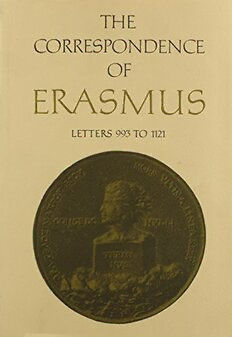
The Correspondence of Erasmus: Letters 993 to 1121 (1519-1520) PDF
Preview The Correspondence of Erasmus: Letters 993 to 1121 (1519-1520)
COLLECTED WORKS OF ERASMUS VOLUME 7 This page intentionally left blank THE CORRESPONDENCE OF ERASMUS LETTERS 993 TO 1121 1519 TO 1520 translated by R.A.B. Mynors annotated by Peter G. Bietenholz University of Toronto Press Toronto / Buffalo / London The research and publication costs of the Collected Works of Erasmus are supported by the Social Sciences and Humanities Research Council of Canada. The publication costs are also assisted by University of Toronto Press. www.utppublishing.com © University of Toronto Press 1987 Toronto / Buffalo / London Printed in Canada Printed on acid free paper Canadian Cataloguing in Publication Data Erasmus, Desiderius, d. 1536. [Works] Collected works of Erasmus Includes index. Partial contents: v. 7. The correspondence of Erasmus: letters 993 to 1121, 1519 to 1520 / translated by R. A.B. Mynors; annotated by Peter G. Bietenholz. ISBN 0-8020-5607-5 1. Erasmus, Desiderius, d. 1536. 1. Title. PA8500 1974 876'. 04 C74-6326-X rev Collected Works of Erasmus The aim of the Collected Works of Erasmus is to make available an accurate, readable English text of Erasmus' correspondence and his other principal writings. The edition is planned and directed by an Editorial Board, an Executive Committee, and an Advisory Committee. EDITORIAL BOARD Peter G. Bietenholz, University of Saskatchewan Alexander Dalzell, University of Toronto Anthony T. Graf ton, Princeton University Paul F. Grendler, University of Toronto James K. McConica, University of Toronto, Chairman Erika Rummel, Executive Assistant Robert D. Sider, Dickinson College J.K. Sowards, Wichita State University G.M. Story, Memorial University of Newfoundland Craig R. Thompson, University of Pennsylvania EXECUTIVE COMMITTEE Peter G. Bietenholz, University of Saskatchewan Harald Bohne, University of Toronto Press Alexander Dalzell, University of Toronto Anthony T. Graf ton, Princeton University Paul F. Grendler, University of Toronto James K. McConica, University of Toronto Ian Montagnes, University of Toronto Press R.J. Schoeck, University of Colorado R.M. Schoeffel, University of Toronto Press, Chairman Robert D. Sider, Dickinson College J.K. Sowards, Wichita State University G.M. Story, Memorial University of Newfoundland Craig R. Thompson, University of Pennsylvania Prudence Tracy, University of Toronto Press ADVISORY COMMITTEE Danilo Aguzzi-Barbagli, University of British Columbia J. Trapman, Koninklijke Nederlandse Akademie van Wetenschappen Maria Cytowska, University of Warsaw O.B. Hardison jr, Georgetown University Otto Herding, Universitat Freiburg Jozef IJsewijn, Katholieke Universiteit Leuven Robert M. Kingdon, University of Wisconsin Paul Oskar Kristeller, Columbia University Maurice Lebel, Universite Laval Jean-Claude Margolin, Centre d'etudes superieures de la Renaissance de Tours Bruce M. Metzger, Princeton Theological Seminary Clarence H. Miller, St Louis University Heiko A. Oberman, University of Arizona Margaret Mann Phillips, University of London John Rowlands, British Museum J.S.G. Simmons, Oxford University John Tedeschi, University of Wisconsin J.B. Trapp, Warburg Institute Contents Illustrations viii Preface ix Map showing the principal places mentioned in volume 7 xiv LETTERS 993 TO 1121 1 The Dialogue of the Two-tongued and the Trilinguals Dialogus bilinguium ac trilinguium translated by Paul Pascal annotated by Peter G. Bietenholz and Paul Pascal 329 Notes 349 Table of Correspondents 438 Works Frequently Cited 441 Short-Title Forms for Erasmus' Works 444 Index 449 Illustrations Lorenzo Campeggi 8 Lady Alice More 20 Pope Leo x 56 Etienne Poncher 82 Floris van Egmond 84 Frederick in, Elector of Saxony 104 Henry Guildford 106 Emperor Ferdinand I 164 Johannes Oecolampadius 202 Willibald Pirckheimer 234 Medal of Erasmus, with the figure of Terminus on the reverse 260 The Field of Cloth of Gold 292-3 Juan Luis Vives 296 Philippus Melanchthon 314 Preface On i July 1519, when Erasmus wrote the first letter published in this volume, he had lived for two years in Lou vain. All things considered, it had been a most agreeable time, productive and carefree. He continued to occupy his rooms at the College of the Lily for almost as long again, but if we can believe the surviving letters, his last two years in Louvain turned out to be very different. Mutual recognition of scholarly achievement which led initially to Erasmus' co-option into Louvain's renowned faculty of theology was giving way to bitter conflict and controversy. In this respect Louvain was a micro- cosm of Erasmus' world, which was undergoing deep strain. Exuberant expectation of a golden age of civilized Christianity was giving way to helpless apprehension at the progress of what Erasmus often called the 'Lutherana tragoedia/ a play that was to end in catastrophe.1 Erasmus was, above all, a writer and scholar; in the second half of his stay in Louvain, however, his literary and scholarly output fell notably short of the preceding period. In 1517 he had given the reading public two of the finest of his shorter treatises, the Querela pads and the Ratio verae theologiae.2 After that he published some essays originally composed decades earlier,3 but no really new literary work was launched until the Colloquia of March 1522.4 The monumental scholarly achievement of the first half of his stay in Louvain was of course the second edition of the New Testament,5 while his edition of Cyprian was a remarkable pioneering effort.6 Neither had an immediate sequel in the second half, although before Erasmus left the Netherlands for good - and especially during the carefree summer of 1521 spent at Anderlecht7 - he must have drafted a good deal of the new Colloquia and also done some preliminary work on other new publications that appeared during the early months of his stay at Basel.8 At least the paraphrases to the New Testament, a highly influential enterprise grounded on Erasmus' philosophia Christi and based on his preceding labours in the treadmill of the New Testament edition, continued to appear steadily throughout the four years he spent in Louvain and subsequently during the early years in Basel.9
